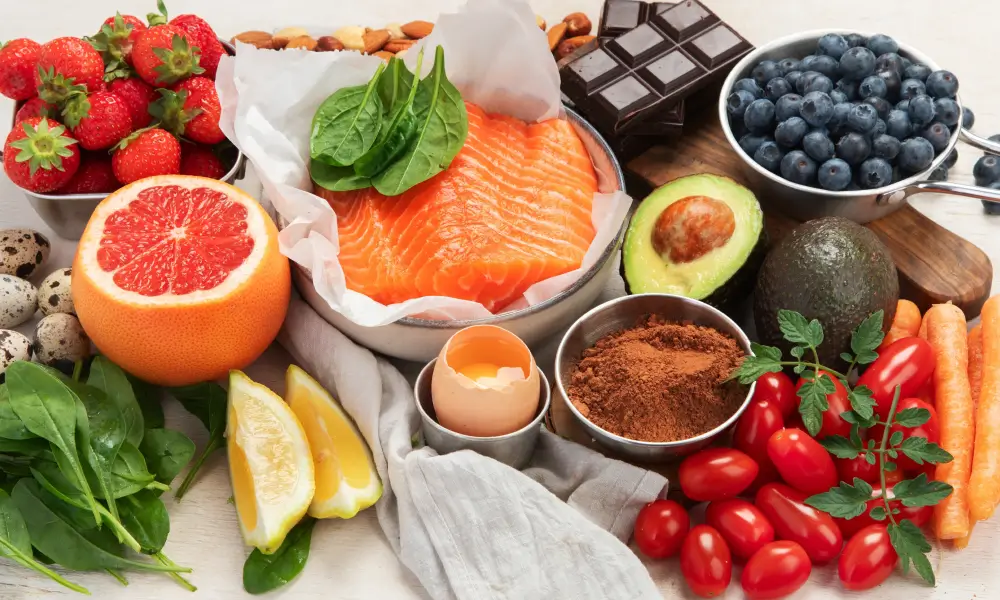Superfoods for Glowing, Radiant Skin

TABLE OF CONTENTS
Skin-glowing food plays a vital role in enhancing beauty from within. What we eat directly affects every cell in our body, including skin cells, making diet one of the most powerful tools for achieving radiant skin. Research shows that specific nutrients can protect against sun damage, reduce wrinkles, and improve skin hydration.
Foods for glowing skin are loaded with essential nutrients that strengthen skin health at a cellular level. This comprehensive article will provide everything you need to know about these superfoods and how to include them in your diet.
How These Superfoods Benefit Your Skin
Primarily, these foods contain compounds that:
Protect skin cells from damage with antioxidants
Support collagen production for firmness and elasticity
Maintain the skin's moisture barrier
Reduce inflammation
Provide UV protection from within
Support cell turnover and regeneration
Top 9 Superfoods for Glowing Skin
Adding these nutrient-dense superfoods to your daily diet offers a natural path to radiant skin from within. These skin-glowing foods work through different mechanisms—providing essential fats, fighting oxidative damage, or supporting collagen production—to give your complexion that coveted healthy glow.
Avocados – Rich in Healthy Fats
Avocados stand out as a premier skin-glowing food due to their impressive content of healthy monounsaturated fats and essential vitamins. These creamy fruits contain substantial amounts of vitamins E and C, vital in maintaining skin vitality and health.
Improves skin elasticity and firmness
Enhances the skin's ability to retain moisture
Protects against environmental damage
Speeds up skin repair processes
Berries – Packed with Antioxidants
These colourful fruits—including blueberries, strawberries, and blackberries—contain high levels of vitamin C and anthocyanins that actively fight free radical damage. Blueberries, in particular, deliver potent antioxidants that help reduce oxidative stress in skin cells, supporting their ability to repair and regenerate.
The skin benefits of regular berry consumption include:
Protection against premature ageing
Support for collagen production
Reduction in inflammation and redness
Enhancement of overall skin tone
Nuts & Seeds – Boost Collagen Production
Nuts and seeds are exceptional skin glow food sources that support collagen production, the protein responsible for skin's firmness and elasticity. Almonds, walnuts, flaxseeds, and chia seeds contain zinc, copper, and vitamin E, which work together to strengthen collagen structures and protect skin cells from damage.
The collagen-boosting properties of nuts and seeds stem from:
Rich content of zinc and copper that act as cofactors in collagen synthesis
Vitamin E that protects collagen from breaking down
Essential fatty acids that support skin cell membranes
Antioxidants that fight collagen-damaging free radicals
Fatty Fish – Omega-3 for Hydration
The skin-enhancing benefits of omega-3-rich fish include:
Improved moisture retention and balanced hydration
Enhanced protection against UV damage
Reduced inflammation and irritation
Strengthened skin barrier function
Leafy Greens – Detox & Nourish Skin
The skin-enhancing properties of leafy greens stem from:
High chlorophyll content that aids the body's natural detoxification
Rich vitamin profile that supports cell regeneration
Antioxidants that protect against environmental damage
Anti-inflammatory compounds that soothe irritated skin
Turmeric – Anti-inflammatory Benefits
Turmeric contains curcumin. It is a bioactive compound with potent anti-inflammatory & antioxidant properties that benefit skin health.
The skin benefits of incorporating turmeric include:
Reduction in inflammation and related skin conditions
Enhanced wound healing and tissue repair
Natural glow and radiance enhancement
Potential improvement in conditions like acne and psoriasis
Sweet Potatoes – High in Beta-carotene
The skin-enhancing properties of sweet potatoes include:
Protection against sun damage and UV radiation
Support for cell turnover and regeneration
Enhancement of skin tone and appearance
Reduction in dry, flaky skin conditions
Green Tea – Fights Free Radicals
Green tea offers exceptional benefits for the skin through its rich content of catechins—polyphenolic compounds with significant antioxidant properties. The skin-enhancing properties of green tea include:
Protection against UV radiation and photo-ageing
Reduction in inflammation and redness
Support for skin repair after sun damage
Enhancement of skin hydration and elasticity
Dark Chocolate – Rich in Flavonoids
The skin benefits of dark chocolate stem from:
Flavanols that stimulate blood flow to the skin
Antioxidants that fight free radical damage
Compounds that protect against sun damage
Elements that enhance skin density and hydration
Best Ways to Include These Superfoods in Your Diet
Transforming these powerful skin-nourishing foods into everyday meals doesn't need to be complicated. Effective incorporation methods can make these nutrient powerhouses a regular diet without requiring complex culinary skills. Many skin-glowing foods can be enjoyed with minimal preparation, ensuring you get their benefits consistently.
Delicious and Simple Incorporation Strategies
Creating a dietary routine rich in skin-glowing foods begins with straightforward integration methods. Start by introducing one or two superfoods at a time rather than overhauling your entire diet at once. This approach enables your taste buds to adjust while preventing dietary overwhelm. Planning your meals with these foods in mind ensures consistent intake of the nutrients your skin needs to maintain its radiance.
Versatility is key for berry-based skin benefits. Add fresh or frozen berries to yoghurt, cereals, and smoothies for a skin-boosting breakfast. When berries aren't in season, frozen varieties maintain similar nutritional profiles, making them equally beneficial for your complexion.
Omega-rich fish integration requires minimal effort for maximum skin benefits. Based on availability and preference, purchase fish fresh, frozen, or canned. Salmon, anchovies, tuna steaks, herring, trout, mackerel, and sardines provide the highest omega-3 content your skin craves. Try different recipes with these ingredients for skin-nourishing meals.
Leafy greens form the foundation of any skin-healthy diet. Incorporate these nutritional powerhouses by adding spinach, Swiss chard, kale, collard greens, or mustard greens to salads. Alternatively, sauté them in a small amount of olive oil for a quick side dish. Adding greens to soups and curry boosts their nutritional value while barely altering the flavour profile.
Nutty skin boosters deserve prominent placement in your daily routine. Keep a trail mix on your work desk or bedside table to increase nutritional intake and avoid unhealthy snacking. Add nuts to oatmeal or yoghurt for breakfast, or enjoy them as a standalone snack. However, remember they are calorically dense, so limit portions to a small handful. Various nut butter (peanut, almond, or cashew) offer the same skin benefits in a spreadable form.
Olive oil is a versatile skin food that's remarkably easy to incorporate. Use this liquid gold instead of butter or vegetable oil when preparing dishes. For an enhanced skin-nourishing condiment, create garlic olive oil by combining olive oil with peeled garlic cloves and baking it in the oven. This produces a delicious toast topping with fewer calories than butter.
Dark chocolate offers surprising skin benefits when consumed mindfully. Choose varieties with at least seventy per cent cocoa to maximise benefits while minimising sugar content. For a decadent yet nutritious dessert, try dark chocolate mousse packed with healthy fats and fibre from avocado, boosted with probiotics from Greek yoghurt.
Creative superfood combinations often enhance nutrient absorption and skin benefits. Combining carotenoid-rich foods (e.g., tomatoes) with fat sources (such as cheese or olive oil) increases the absorption of these skin-protecting compounds. Thick, creamy smoothies loaded with skin-boosting ingredients can use probiotic-rich kefir as their base. A mango-turmeric smoothie combines vitamin C, which produces collagen, with anti-inflammatory turmeric properties.
Breakfast offers prime opportunities for skin food incorporation. A bowl of oatmeal with berries provides whole grains and antioxidants in one meal. According to research, Greek yoghurt with fresh pomegranates delivers antioxidants with more potency than red wine and green tea, alongside protein and healthy fats from added avocado.
For lunch and dinner, vegetable-forward preparations maximise skin benefits—steam or stir-fry cruciferous vegetables, adding healthy oils and herbs for flavour.
Snack strategies should focus on skin-supporting choices. Swap processed snacks for nuts or dried fruits for mid-day energy boosts. Chia, pumpkin, hemp, and flaxseeds work wonderfully as garnishes for various dishes due to their small size and mild flavour. Fresh grinding of flaxseeds onto smoothies or salads adds omega-3 fats to support skin health.
Experiment with different preparations until you discover combinations that please your palate and skin.

Conclusion
Achieving radiant, glowing skin certainly extends beyond creams and serums. Food truly serves as a powerful medicine for your skin, delivering essential nutrients directly to skin cells through your bloodstream. Skin-nourishing foods work most effectively when consumed regularly as part of a balanced diet. Small, consistent dietary changes yield better results than occasional superfood binges.
FAQs
Are superfoods a guaranteed solution for perfect skin?
Superfoods alone cannot guarantee perfect skin. Despite their nutrient-rich profiles, these foods work best as part of a balanced diet rather than miracle solutions. Your complete dietary pattern matters more than isolated superfoods.
Should I take skin-boosting nutrients through supplements instead?
Obtaining nutrients from whole foods typically offers greater benefits than supplements. Although supplements might seem convenient, they don't provide the same advantages as consuming actual skin-glowing foods.
What's the most effective dietary approach for healthy skin?
Rather than eliminating specific foods, focus primarily on consistent nutrition, including various skin-glowing foods. Balancing blood sugar through regular meals every 3-5 hours with protein, healthy fats, fibre-rich starches, and vegetables creates the foundation for healthy skin. Remember that what you eat significantly affects your skin health, making essential nutrients crucial for protecting your complexion.






